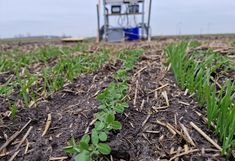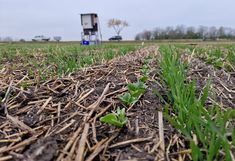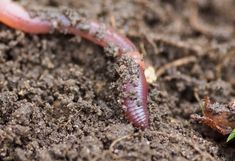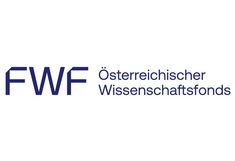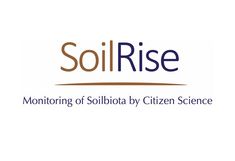Biodiversity cropping
The project “Biodiversity cropping” at the BOKU Research Farm aims to develop a sustainable farming system by introducing companion crops, which are grown alongside main crops to increase plant diversity. In Austria, the intensification of agriculture has led to simplified crop rotations, primarily focusing on three main crops (wheat, barley and maize). The enhanced resilience of production systems by using companion crops provide benefits like soil cover, nutrient supply, and reduced reliance on nitrogen fertilizers.
The main goals include improving soil health, stabilizing crop yields and addressing environmental concerns such as water use efficiency, nitrate leaching and biodiversity loss, through companion cropping. Companion crops, particularly legumes, can contribute to nitrogen supply for main crops while preventing nitrate leaching into groundwater. The project will evaluate the impact of different companion crop systems on the growth and yield of main crops, nitrogen levels in the soil and crops and soil water content. Additionally, these companion crops can enhance biodiversity and the abundance of earthworms which play a crucial role in maintaining soil quality.
The objectives of the project align with several Sustainable Development Goals (SDGs), including ensuring the sustainability of food production systems, efficient water use through sustainable water management, and preserving land ecosystems to prevent soil degradation and maintain biodiversity.
In practical terms, the project will be conducted over three years starting in Oct 2023, monitoring various parameters in a crop rotation system such as soil moisture, plant available nitrogen, nitrogen leaching, C:N ratio in plants, yield, yield components, soil cover, leave area, earthworm abundance and community. The project will assess the effects of companion crops and different fertilizer strategies on both the main crops and the overall ecosystem. The aim is to create an alternative field management that enhances agricultural sustainability while considering the impacts of climate change in the specific region.
Project lead: Pia Euteneuer
University of Natural Resources and Life Sciences (BOKU), Vienna, Reserach Farm, Gross-Enzersdorf, Austria
Thomas Weninger, Alexander Eder
Federal Agency for Water Management, Institute for Land and Water Management Research Petzenkirchen, Austria
Czech University of Life Sciences Prague, Department of Agroecology and Biometeorology; Department of Agroenvironmental Chemistry and Plant Nutrition, Prague, Czech Republic
University of Central Lancashire, School of Engineering and Computing, Preston, United Kingdom
Duration: 1.10.2023 – 30.9.2027
Funded by BIOS Science Austria
SoilRise: Unveiling the Hidden World Beneath Our Feet
Our planet's health depends on the often-overlooked world beneath our feet – the rich tapestry of soil and its inhabitants. Meet SoilRise, a project aiming to shed light on soil biodiversity, specifically focusing on the humble yet crucial earthworm.
Why Earthworms Matter:
Earthworms play a vital role in maintaining soil quality and the balance of ecosystems. They are ecosystem engineers, shaping the underground world and connecting it to life above ground. Despite their significance, soil organisms are often neglected in conservation efforts.
The SoilRise Mission:
SoilRise recognizes the urgent need to monitor and protect soil biodiversity. The project leverages Citizen Science and an innovative mentor-based approach to involve students, researchers, and the public in the mission to understand and conserve earthworm communities across Europe.
How SoilRise Works:
Citizen scientists, including farmers, gardeners, local authorities, and urban planners, will contribute to a large-scale effort to monitor earthworms. Students, trained as mentors, will guide these citizen scientists in collecting data through a standardized tutorial system. This mentor-based Citizen Science approach aims to not only gather extensive and high-quality data but also to empower individuals and communities to actively participate in environmental monitoring.
Key Objectives:
1. Boosting Data Availability: SoilRise will significantly increase the available data on earthworm biodiversity across Europe, creating a comprehensive picture of their distribution and communities.
2. Raising Awareness: Engaging diverse communities in soil biodiversity monitoring programs will not only contribute to data collection but also raise awareness for the hidden life in the soil.
3. Understanding Earthworm Diversity: By comparing rural and urban environments, considering land use types and management practices, SoilRise seeks to understand the diversity patterns and threats to earthworms.
4. Identifying Species at Risk: SoilRise will contribute to red list assessments, helping identify species at risk and developing tools for their protection.
5. Exploring Intraspecific Variability: Covering a vast West-East gradient in Europe, from France, Ireland, Germany, Austria to Poland, SoilRise will explore variability within species and general diversity patterns.
6. Harmonizing Taxonomy: The project aims to harmonize the taxonomy of earthworms across Europe, clarifying species identification using both traditional and cutting-edge DNA barcoding methods.
7. Social-Ecological Impact: Engaging students as mentors will create a ripple effect, multiplying the socio-ecological impact of SoilRise. It will evaluate scientific outputs and societal outcomes to understand the project's broader influence.
Why It Matters:
In a time of biodiversity depletion and climate change, SoilRise provides a close monitoring of soil biodiversity. By involving citizens, students, and decision-makers in the scientific process, SoilRise aims not only to contribute to ecological research but also to inspire a new generation of soil stewards. This project paves the way for informed conservation decisions, ensuring the health of our soils and, by extension, the health of our soils.
Project core team:
Martin Potthoff (Project lead, SoilRise Germany), Georg-August-University Göttingen, Centre of Biodiversity and Sustainable Land Use, Germany
Pia Euteneuer (SoilRise Austria), University of Natural Resources and Life Sciences, Vienna, Experimental farm Gross-Enzersdorf, Austria
Kevin Hoeffner (SoilRise France), University of Rennes I, Ecobio – Ecosystems, Biodiversity, Evolution, Rennes, France
Morgane Hervé (Living Lab CLEF, France), Living Lab CLEF, Plelan-le-Grand, France
Olaf Schmidt (SoilRise Ireland), University College Dublin, School of Agriculture and Food Science, Ireland
Agnieszka Józefowska (SoilRise Poland), University of Agriculture in Krakow, Department of Soil Science and Agrophysics, Krakow, Poland
Duration: 01/03/2024-28/02/2027
SoilRise Austria is funded by Austrian Science Fund (FWF) (No 6836-B) and Biodiversa+ (European Union under the Grant Agreement no. 101102316).


